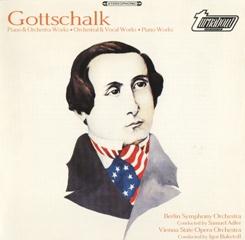Gottschalk - Piano & Orchestral Works ∙ Orchestral & Vocal Works ∙ Piano Works (1971)
Gottschalk - Piano & Orchestral Works ∙ Orchestral & Vocal Works ∙ Piano Works (1971)

CD 1: 01. Grande Fantaisie Triomphale sur L'Hymne National Bresilien 02. Marcha Triunfal y Final de Opera, for Orchestra & Band 03. Symphony No. 1 "La Nuit des Tropiques" - Andante 04. Symphony No. 1 "La Nuit des Tropiques" - Allegro moderato 05. Variations on the Portuguese National Hymn for Piano & Orchestra 06. Escenas Campestres (Cuban Country Scenes) Opera in one Act CD 2: 01. Marche Solennelle 02. Grande Tarantelle for Piano and Orchestra 03. Union - concert paraphrase on Nationsl Airs 04. Five Pieces for Piano four hands - I. Radieuse, grande valse de concert 05. Five Pieces for Piano four hands - II. Ses yeux, polka de concert 06. Five Pieces for Piano four hands - III. La gallina, danse cubaine 07. Five Pieces for Piano four hands - IV. Ojos criollos, danse cubaine 08. Five Pieces for Piano four hands - V. Pasquinade, caprice 09. Symphony No.2 'A Montevideo' Eugene List, Cary Lewis, Brady Millican, Alan Mandel, John Kirkpatrick, Robert Prichard, Guimar Novaes - piano Baritone – Pablo Garcia Soprano – Trinidad Paniagua Tenor – José Alberto Estéves Berlin Symphony Orchestra Conductor – Samuel Adler Vienna State Opera Orchestra Conductor – Igor Buketoff
Louis Moreau Gottschalk (1829-1869), probably the most important American composer of the 19th century, infused European romanticism with indigenous North and South American elements.
Louis Moreau Gottschalk was born on May 8, 1829, in New Orleans, the son of a Jewish Englishman and a Creole woman. He exhibited extraordinary talent at the age of 3. At 13, after experience as a church organist and a concert pianist, he went to Paris to study, absorbing the romantic ideas and attitudes of the time and acquiring an elegant, polished manner.
Gottschalk took Paris by storm when he made his 1845 concert debut. Frédéric Chopin predicted a brilliant future for him, and Hector Berlioz spoke of his "exquisite grace … brilliant originality … charming simplicity … thundering energy."
When Gottschalk returned to America, P. T. Barnum offered him a contract for $20,000 yearly plus expenses; Gottschalk refused scornfully. Compared favorably to Beethoven in the reviews of his New York debut, he launched his American career.
But Gottschalk's world soon collapsed. His father died, and he was forced to assume a considerable debt and to support his mother and six brothers and sisters. The stress caused the quality of his compositions to deteriorate. He wrote shameless potboilers. His fresh, original impulses were eroded as he became more adept at composing vapid salon music. He gave concerts almost daily—80 concerts in New York alone within a 2-year period.
Then Gottschalk retreated for almost 6 years to a life of splendid dissipation in Cuba and the Caribbean islands. Yet there he wrote some of his best compositions.
Gottschalk resumed his hectic activity during the Civil War period. His concerts inspired phenomenal enthusiasm. Moreover, he organized mammoth festivals involving hundreds and even thousands of musicians, receiving thunderous ovations from the public. During his largest festival, in Rio de Janeiro in 1869, Gottschalk's Marche triomphale aroused tremendous enthusiasm. Exhausted by his feverish way of life and weakened by yellow fever, he died 2 weeks later.
Gottschalk's music infuses European structures with American folk and popular music as well as Latin American elements. He wrote two operas and several orchestral works. His piano works show his wide range, romantic sweep, rhythmic freshness, and varieties of mood and color.
Bamboula and Le Bananier, early works, contain infectious rhythms and Creole tunes. Souvenirs d'Andalousie and Manchega use Spanish color and rhythms. El cocoyé and La gallina are musical essays on Cuban music. Suis-moi and O! Ma charmante, epargnez-moi! are forays into the music of the Antilles. L'Union and America utilize patriotic airs. Chant du soldat suggests the romantic sweep of Berlioz or Chopin. Impromptu and Danza are sparkling salon pieces. However, Gottschalk's best-known works, The Dying Poet and The Last Hope, are both considered potboilers. ---biography.yourdictionary.com
download (mp3 @320 kbs):
yandex mediafire ulozto bayfiles








